Cockatiels are popular pet birds known for their friendly personalities and beautiful plumage. They are also known for their vocalizations, which include chirps, whistles, and songs.
However, sometimes cockatiels may make a specific type of noise that can cause concern for their owners.
This noise is often described as a high-pitched squeak or clicking sound, and it can be heard with each breath the bird takes. And this noise is commonly referred to as a “script” by cockatiel owners.
In this blog post, we will be discussing the common causes of this squeaking noise in cockatiels and what steps can be taken to address it.
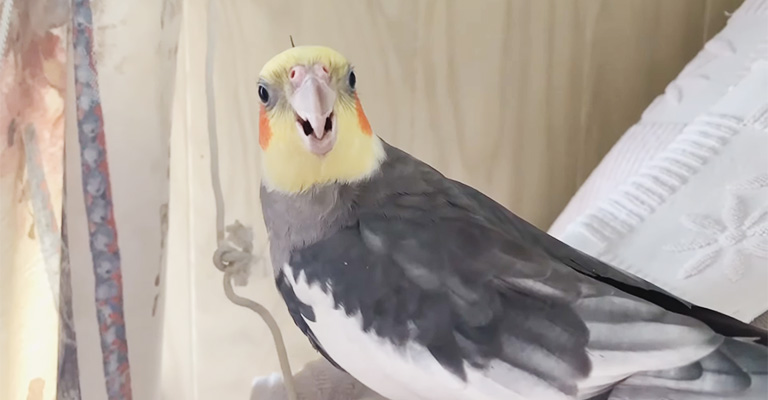
Causes of Squeaking Noises in Cockatiels
There can be different causes behind a cockatiel making squeaking noises. Some of the possible causes are as followed.
Respiratory Issues
One of the most common causes of squeaking noises in cockatiels is respiratory problems. This can be a sign of labored breathing or difficulty getting air into the bird’s lungs.
Various factors can contribute to these issues, including infections, inflammation, or physical obstructions in the airway.
- Infections: Bacterial, viral, or fungal infections can affect the respiratory system of cockatiels, leading to difficulty breathing and pronounced squeaking noises.
- Inflammation: Inflammation of the respiratory system can be caused by allergies, irritants, or other underlying health conditions. The inflamed airways can result in restricted airflow, causing the bird to make squeaking noises while breathing.
- Physical Obstructions: Cockatiels may accidentally inhale or ingest foreign objects such as feathers or pieces of food, which can become lodged in their airway. These obstructions can obstruct the airflow and cause the characteristic squeaking sound.
Emotional Distress
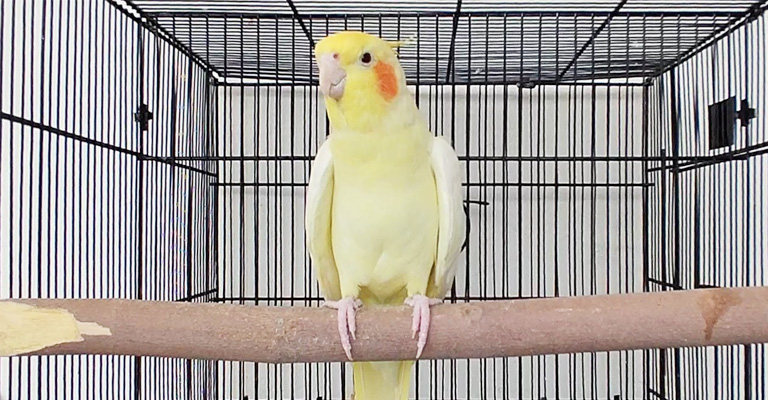
Cockatiels, like other animals, can experience emotional distress. Factors such as stress, fear, or excitement can trigger rapid breathing in birds, leading to the production of squeaking sounds. These noises may be a manifestation of the bird’s heightened state of arousal or anxiety.
Age-Related Issues
As cockatiels age, they become more susceptible to certain health conditions, including respiratory problems.
Chronic bronchitis, for example, can develop in older birds and cause difficulties in breathing. The resulting wheezing or squeaking noises can be indicative of age-related respiratory issues.
How to Identify Squeaking Noises as a Problem
Now the question is how can you identify the squeaking noise of your cockatiel. Well, there are ways for it and some of the effective ways are as followed.
Observe Breathing Patterns
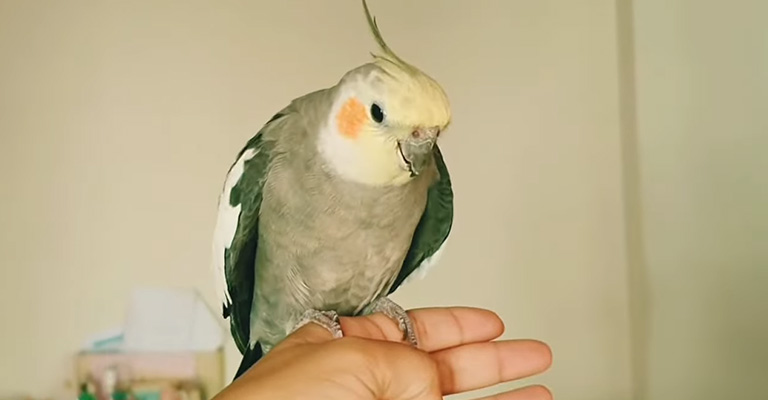
One of the best ways to determine if a squeaking noise in your cockatiel is a problem is by observing the bird’s breathing. Signs of labored breathing can indicate respiratory distress.
Look for rapid breathing, open-mouthed breathing (panting), flaring of the nares (nostrils), or cyanosis (a bluish tint to the comb and wattle). These are all indicators that the bird may be struggling to breathe properly.
Monitor Behavior and Appearance
Pay attention to any changes in your cockatiel’s behavior or appearance that accompany the squeaking noise.
If the bird appears less active, has a decreased appetite, is fluffed up and lethargic, or shows signs of discomfort, it may be indicative of an underlying health issue.
Changes in vocalization patterns, such as increased or unusual vocalizations, can also accompany respiratory problems.
Frequency and Duration of the Squeaking Noise
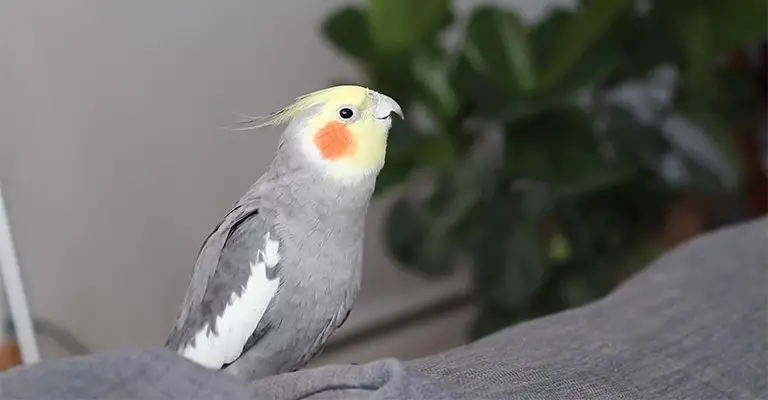
Take note of the frequency and duration of the squeaking noise. If the noise is persistent, occurring consistently and frequently throughout the day, it is more likely to be a problem.
On the other hand, if the noise is occasional or sporadic, it may not be as concerning. Prolonged or continuous squeaking noises should raise concerns and prompt further investigation.
Watch for Other Symptoms
In addition to the squeaking noise, be on the lookout for other symptoms that could indicate a problem.
These may include coughing, sneezing, nasal discharge, wheezing, or difficulty perching. Any combination of these symptoms, along with the squeaking noise, can signal a respiratory issue or other health problem.
How to Respond to Squeaking Noises in Cockatiels?
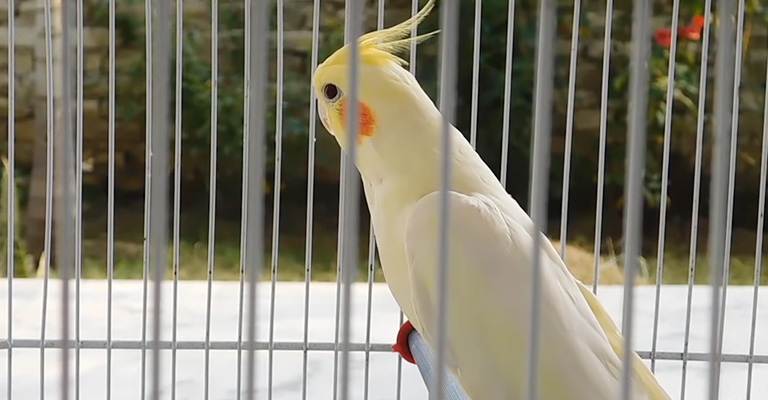
Now, let’s talk about what to do or how to respond when your bird is making such an irritating noise. Well, the following tips will help you in this case, for sure.
Monitor the Bird’s Health and Behavior
As soon as you notice your cockatiel making a squeaking noise, closely observe its health and behavior.
Look for signs of labored breathing, changes in activity level, appetite, or appearance. Take note of the frequency and duration of the noise. Monitoring these factors will help you assess the severity of the situation.
Seek Veterinary Care
If the squeaking noise persists, becomes more pronounced, or is accompanied by concerning symptoms, it is crucial to take your cockatiel to an avian veterinarian.
Avian veterinarians are specialized in bird health and can conduct a thorough examination, perform necessary diagnostic tests, and determine the underlying cause of the noise. Prompt veterinary care is essential for identifying and addressing any potential health issues.
Provide a Warm and Safe Environment
While awaiting veterinary care, ensure your cockatiel is kept in a warm and stress-free environment. Birds in distress may benefit from a quiet and comfortable space.
Ensure the temperature in the bird’s habitat is appropriate and avoid exposing them to drafts or sudden temperature changes.
Avoid Harmful Household Items
Be mindful of the household items that could potentially harm your cockatiel’s respiratory system. Cleaning products, air fresheners, candles, and other household chemicals may emit fumes that can be toxic to birds.
Keep your cockatiel away from areas where these products are used and maintain good ventilation in the bird’s living space.
Follow Veterinary Recommendations
Once you have consulted an avian veterinarian, follow their recommendations for treatment and care.
This may include administering prescribed medications, adjusting the bird’s diet, providing additional humidity, or implementing environmental modifications to promote healing and recovery. Regular follow-up visits may be necessary to monitor the bird’s progress.
FAQs
Can the squeaking noise in my cockatiel be caused by a lack of attention or interaction?
While lack of attention or interaction can cause stress and emotional distress in cockatiels, it is not a direct cause of the squeaking noise. However, providing your cockatiel with regular interaction and attention can help prevent stress and emotional distress, which can lead to other health issues.
Is there anything I can do at home to treat my cockatiel’s squeaking noise?
While it is important to monitor your cockatiel’s health and behavior at home, it is not recommended to try and treat the squeaking noise on your own. The best course of action is to take your cockatiel to an avian veterinarian as soon as possible for an examination and appropriate treatment.
Can the squeaking noise be a sign of something more serious, like cancer?
The squeaking noise can be a symptom of a variety of underlying conditions, and some of them may be serious. It’s important to take your cockatiel to an avian veterinarian as soon as possible to determine the underlying cause of the noise and provide the appropriate treatment.
My cockatiel is making a squeaking noise, but it seems fine otherwise.
Should I still take it to the vet? A: Yes, it’s important to take your cockatiel to an avian veterinarian as soon as possible if it’s making the squeaking noise, even if it seems fine otherwise. Birds often hide their illnesses and by the time symptoms appear, they are usually very sick. So, it’s important to pay attention and not wait for the symptoms to appear to take action.
If my cockatiel gets an infection, will it always make the squeaking noise?
The squeaking noise is one symptom of an infection, but it can also be caused by other factors such as respiratory issues or physical obstruction. An avian veterinarian will be able to determine the underlying cause of the noise and provide the appropriate treatment.
Wrapping Up
If your cockatiel is making a high-pitched squeaking or clicking noise with each breath, it is important to pay attention and take action.
This noise can be caused by various factors including respiratory issues, illness, physical obstructions, emotional distress, or age-related problems.
Monitoring your bird’s health, behavior, and the frequency of the noise is crucial in determining if it is a problem. Seeking veterinary care from an avian veterinarian is essential for a proper diagnosis and treatment plan.
So, let us know how the tips work in the case of your cockatiel. Thank you for your time.